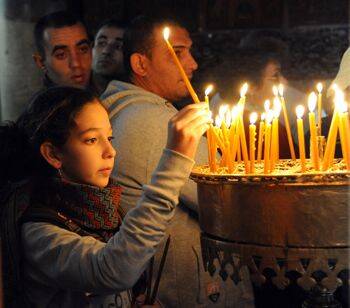UNESCO has placed sites—including the Church of the Nativity—in Bethlehem, West Bank, on its list of World Heritage in Danger. In a 13-6 vote with two abstentions, the World Heritage Committee added the sites to the danger list on June 29 during a meeting in St. Petersburg. In its application, Palestine, which became a full UNESCO member last October—said the church had not had upkeep and repairs since 1967, when Israel began occupation of the West Bank and because of Israeli restrictions on movement in and out of the territory. Inscribing a site on the List of World Heritage in Danger allows the World Heritage Committee to allocate immediate assistance from the World Heritage Fund to the endangered property. It also alerts the international community to situations in the hope that it can join efforts to save these endangered sites. The United States and Israel—who were not committee members—had opposed the move. Last fall, the custos of the Holy Land, Franciscan Father Pierbattista Pizzaballa, told the Italian bishops' news agency SIR the Franciscans were hoping the Church of the Nativity would not be included on a UNESCO list. He said he and other Christian leaders believed the initiative would make "it harder for us to run (the church), because, under UNESCO rules, the board in charge of running a place for the U.N. agency is the government, not the owner of a site." The Franciscans are the Catholic partner in maintaining the Status Quo, a 19th-century agreement that regulates jurisdiction of and access to key Christian sites—including the Church of the Nativity—in the Holy Land for Catholic, Orthodox and other Christian communities. A Franciscan source said that adding UNESCO to an already complex situation would only make it more complicated.
Church of Nativity Added to List of Endangered Heritage Sites
Show Comments (
)
Comments are automatically closed two weeks after an article's initial publication. See our comments policy for more.
The latest from america
After an early morning attack on the Holy Family Church in Gaza, Pope Leo XIV called for an immediate ceasefire, dialogue and peace in the region.
Something essential is lost when generations remain siloed at church.
You’ve got a 401K. But do you have a spiritual retirement plan?
A brief opening to shore up progress toward stability in Syria unfortunately coincides with Trump administration decisions to sharply curtail humanitarian and development assistance and to terminate the U.S. Agency for International Development.








